Bonjour once again!
Blogging has proved to me a larger beast than I once thought. Although I never thought of myself as being “creative”, per se, I did think that it would be easy to talk about my time here in Tours. Each day I am introduced to another word, another phrase, another idea, another place, and another person – each unique from the last.

Earlier this week at dinner I asked my host mother how to say overwhelmed but, not knowing the word, had to search to find the words to piece together a definition (the word is submerger– if you were wondering). Through all of this sensory overload, finding the most eloquent and comprehensive way to explain things to others has been a difficult, but rewarding task. In this post I will briefly cover the concept of work in France and some socio-political controversy that surrounds a critical aspect of French work life which are strikes. Then, I will touch on my recent trip to Paris (note the rad picture- when in France, am I right?!)
Since last writing I have successfully started my third week in Tours. I am astounded at how quickly time passes and how my journey here is almost half way finished. It is only at the start of my third week that my automated responses to people are in French, not English, and hearing French at the tables next to me at cafés has become comforting, instead of unnerving. My week days in Tours have fallen into a beautiful routine with classes in the morning and afternoons spent at Amadeus Bagel, a small coffee shop where the two women who work there greet me with a familiar smile and ask “un café au lait?”, already knowing my answer will be “bien sûr!”. The familiarity of this coffee shop has awarded me the ability to have interesting interactions with these two women and who, due to increased engagement, have commented to me that my French has noticeably improved- something I am immensely proud of. It feels like home to be known in a place where you spend many hours each day- an experience that is quite regular to me back in Alabama. Further, spending my afternoons here doing homework, reading Le Monde (the French newspaper I enjoy reading), or playing cards with my friends from the Institute has allowed me to observe, in a sense, the way the French live. It is not unlikely that I will look over to the door of the shop and find the “Nous sommes fermés” (We are closed) sign in the door only to look back to the couch and find one of the women napping and the other with a group of her friends smoking and laughing outside only to come idly walking in humming a song and changing the sign to “Nous Sommes Ouverts- Bienvenue” (We are open- Welcome). When I approach the women to ask if I should leave they only laugh and smile and comment that they are only taking a break for an hour or so. I have grown accustomed to this style of work and only wish this aspect of sociality in the workplace would translate back to the United States.
The concept of work (travail– like in the title!) in France has been something my class at the Institute has been studying for the past couple of days which is probably the reason for my recent interest in discussing it with my host mother at dinner. French workers are given many benefits from their employers that I was not accustomed to, such as health care for everybody. Further, one I found more shocking is that every French working citizen is, by law, guaranteed five weeks of paid vacation time. In the United States, there is no law that states how much time off your employer must give you but is instead given based on criteria such as rank in the corporation, time spent working with the company, etc. At dinner that night I asked my host mother if what I had learned was actually true, I couldn’t believe that an employer would automatically grant their employees so much vacation. My host mother laughed and said “but of course, and I have eight weeks off!”. Eight weeks? Eight weeks!? That’s two full months of not working during the year- what a life! We also started discussing other concepts of the work life in France, such as les grèves (strikes). As my host mother commented, “When the French workers are not happy with something- they strike”, then, under her breathe she mumbled “even if those workers have more benefits that most workers – such as early retirement!”. Softly, I asked her what she meant by this. She was, of course, talking about the workers of the SNCF railway company who were striking due to French president, Emmanuel Macron, implementing new statues that were not favorable amongst the workers. This issue, although political at its core, has a stark social impact, on people like my host mother, who feel it in their day to day lives.
I decided I would try to discuss this issue further with Paula and Dominique, my two professors at the Institute. As we were discussing work in class, the subject was fitting. When I asked Paula about it, she shook her head, noticeably irritated by the subject itself. She commented how she takes the train to work everyday, as she does not live in Tours and, having to determine when the train will be running is an annoyance in her daily life. While these workers are fighting for more rights, Paula is trying to simply get to work everyday. Although she recognizes that striking is a part of the French culture, she does not like the impact that she feels from it day in and day out. Dominque, possibly two decades older than Paula, feels the same way. This sentiment I’m sure is not an unpopular opinion amongst the French, especially those who rely on the train for daily transportation. Thus, this issue that is purely political for the train workers, is a huge social issue for others.
Being an American, it never occurred to me that the strikes from the SNCF workers could have any affect on me. The issue would only be something I read about in the papers or heard my host mother or professors speak about. However, I realized the inconvenience of the strikes when I wanted to book a train ticket for a weekend in Paris. It never occurred to me that I would be unable to get from Point A to Point B. However, the day I wanted to book my train ticket for was a day the workers were striking! Trying to figure out the website in French and determine what trains would be running that day was a stressful component for booking a trip! While this was only a minor inconvenience and I was able to simply take the bus (which was actually a lot cheaper), it was a reminder that current transportation in this system is not as easy as Americans are convinced it is and allowed me to think about how difficult it must be for some people, like my teachers, to plan their days around when the workers will be striking.
After making it to Paris I was back to observing the laid back culture of work that I was accustomed to at my little coffee shop. On Saturday, after a long day of walking and seeing many, admittedly, “touristy” attractions like the Louvre, Musée D’Orsay, Notre Dame Cathedral, the Arc de Triomphe, and sitting on the lawn of the Eiffel Tower at sunset we went to have dinner at a small brasserie we found in the 6th arrondissement. After enjoying a classic French meal of steak frites (steak and fries), we sat for another hour. While having two hour long dinners is not an uncommon experience for me, adjusting to the waiter simply not even entertaining the idea of giving you a check until a couple of hours sitting down, is. While hoping I am not stereotyping or generalizing, I have noticed that the French live more social workplace lives, an aspect I find appealing and charming.


Per usual, This blog has taken some turns covering topics such as my astonishment at the passage of time, to the concept of work engrained in French society and some of its benefits and downsides, and somehow making it to a quick description of my weekend trip to Paris. Tune in next time for another scatterbrained blog from Tours!
Bien à vous!
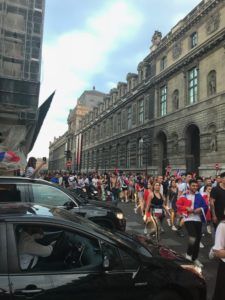

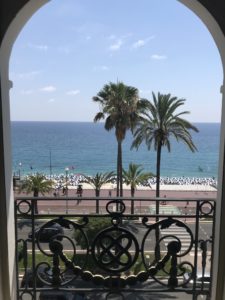
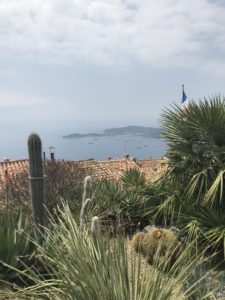
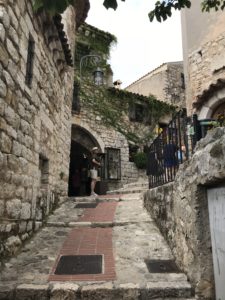
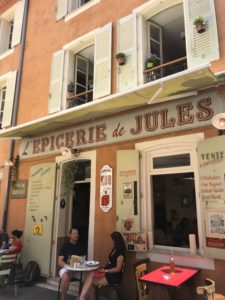
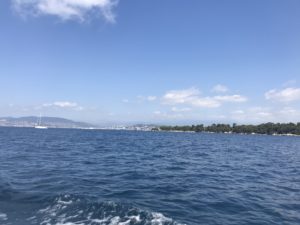






 sée des Beaux Arts, the Église (church) de St. Martin, and have taken a 20km bike ride to the Chatêaux de Villandry with my Swiss friend, Lara. There, we spent the afternoon exploring the surrounding French country side, strolling through the marvelously landscaped castle grounds, and enjoying a typical French lunch of a baguette, meats, and various cheeses.
sée des Beaux Arts, the Église (church) de St. Martin, and have taken a 20km bike ride to the Chatêaux de Villandry with my Swiss friend, Lara. There, we spent the afternoon exploring the surrounding French country side, strolling through the marvelously landscaped castle grounds, and enjoying a typical French lunch of a baguette, meats, and various cheeses.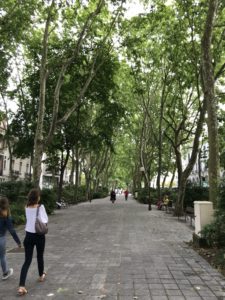 The city of Tours is beautiful, charming, and has seemed to make a personal connection with me where each morning I walk along the sun soaked, tree lined, Grand Boulevard that makes me seem moreso like I am at home than just visiting. Further, I have begun to adapt to the little English that I hear whilst strolling through the city and am starting to be able to pick up French conversations when I am walking. It is crazy how much easier it is to understand and speak a language when everyone around you speaks it. My teachers at the Institut are some of the most exciting people I have ever met, especially my teacher Paula. Paula encourages mistakes and allows her students to form a personal connection with her and the other kids in the class. It is because of her that I have met people from all over the world, united by a common interest in learning French.
The city of Tours is beautiful, charming, and has seemed to make a personal connection with me where each morning I walk along the sun soaked, tree lined, Grand Boulevard that makes me seem moreso like I am at home than just visiting. Further, I have begun to adapt to the little English that I hear whilst strolling through the city and am starting to be able to pick up French conversations when I am walking. It is crazy how much easier it is to understand and speak a language when everyone around you speaks it. My teachers at the Institut are some of the most exciting people I have ever met, especially my teacher Paula. Paula encourages mistakes and allows her students to form a personal connection with her and the other kids in the class. It is because of her that I have met people from all over the world, united by a common interest in learning French. While writing this, I am sitting at a local café on the river taking a break from reading a book that is way above my level and I am realizing that things are not as clearly or eloquently put as I wish I could describe them. Yet, in a way, that has been the way I have spent my first week here. It has not been without error or like a scene out of a movie. In fact, there have been struggles with having to explain myself in a language that is not my native tongue and moments of frustration when I feel that I am not being understood correctly. But, to me, that is what I have found is the beauty of this experience – being okay with being uncomfortable. Instead of going to a café and asking if they speak english, I try to place all of my orders in French and, when out with my friends, we attempt to speak French with each other, even when all of us understand English. This experience has been about placing myself in a culture that is unlike my own and learning to embrace all of the hours I have spent lost in the city, the conversations I wish had gone differently, and adapting to doing things that are different than have always been done.
While writing this, I am sitting at a local café on the river taking a break from reading a book that is way above my level and I am realizing that things are not as clearly or eloquently put as I wish I could describe them. Yet, in a way, that has been the way I have spent my first week here. It has not been without error or like a scene out of a movie. In fact, there have been struggles with having to explain myself in a language that is not my native tongue and moments of frustration when I feel that I am not being understood correctly. But, to me, that is what I have found is the beauty of this experience – being okay with being uncomfortable. Instead of going to a café and asking if they speak english, I try to place all of my orders in French and, when out with my friends, we attempt to speak French with each other, even when all of us understand English. This experience has been about placing myself in a culture that is unlike my own and learning to embrace all of the hours I have spent lost in the city, the conversations I wish had gone differently, and adapting to doing things that are different than have always been done.